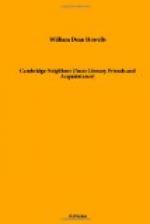“Don’t go, Keeler,” I entreated him, when he came to tell me of his intention. “They’ll garrote you down there.”
“Well,” he said, with the air of being pleasantly interested by the coincidence, as he stood on my study hearth with his feet wide apart in a fashion he had, and gayly flirted his hand in the air, “that’s what Aldrich says, and he’s agreed to write my biography, on condition that I make a last dying speech when they bring me out on the plaza to do it, ’If I had taken the advice of my friend T. B. Aldrich, author of ‘Marjorie Daw and Other People,’ I should not now be in this place.’”
He went, and he did not come back. He was not indeed garroted as his friends had promised, but he was probably assassinated on the steamer by which he sailed from Santiago, for he never arrived in Havana, and was never heard of again.
I now realize that I loved him, though I did as little to show it as men commonly do. If I am to meet somewhere else the friends who are no longer here, I should like to meet Ralph Keeler, and I would take some chances of meeting in a happy place a soul which had by no means kept itself unspotted, but which in all its consciousness of error, cheerfully trusted that “the Almighty was not going to scoop any of us.” The faith worded so grotesquely could not have been more simply or humbly affirmed, and no man I think could have been more helplessly sincere. He had nothing of that false self-respect which forbids a man to own himself wrong promptly and utterly when need is; and in fact he owned to some things in his checkered past which would hardly allow him any sort of self-respect. He had always an essential gaiety not to be damped by any discipline, and a docility which expressed itself in cheerful compliance. “Why do you use bias for opinion?” I demanded, in going over a proof with him. “Oh, because I’m such an ass—such a bi-ass.”




